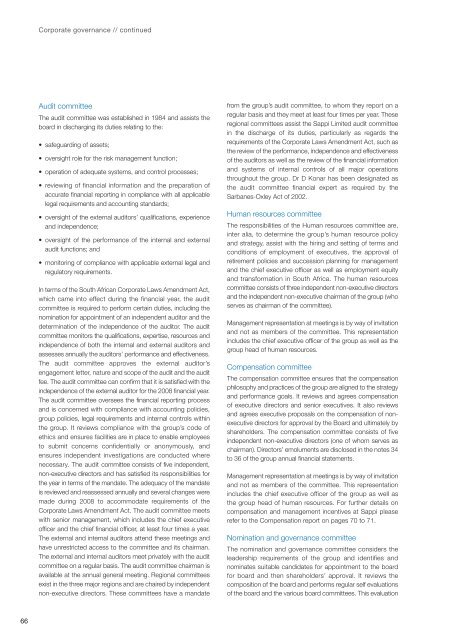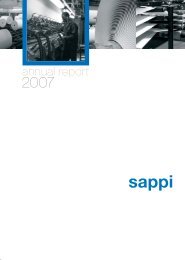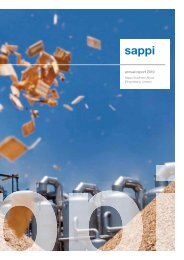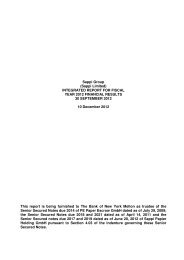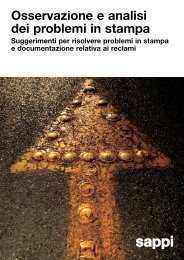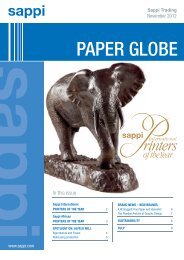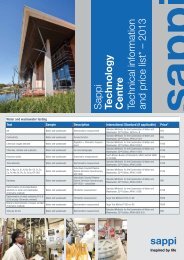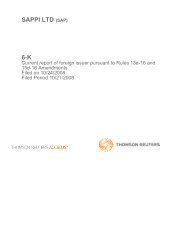2008 Annual report - Sappi
2008 Annual report - Sappi
2008 Annual report - Sappi
You also want an ePaper? Increase the reach of your titles
YUMPU automatically turns print PDFs into web optimized ePapers that Google loves.
Corporate governance // continued<br />
Audit committee<br />
The audit committee was established in 1984 and assists the<br />
board in discharging its duties relating to the:<br />
• safeguarding of assets;<br />
• oversight role for the risk management function;<br />
• operation of adequate systems, and control processes;<br />
• reviewing of financial information and the preparation of<br />
accurate financial <strong>report</strong>ing in compliance with all applicable<br />
legal requirements and accounting standards;<br />
• oversight of the external auditors’ qualifications, experience<br />
and independence;<br />
• oversight of the performance of the internal and external<br />
audit functions; and<br />
• monitoring of compliance with applicable external legal and<br />
regulatory requirements.<br />
In terms of the South African Corporate Laws Amendment Act,<br />
which came into effect during the financial year, the audit<br />
committee is required to perform certain duties, including the<br />
nomination for appointment of an independent auditor and the<br />
determination of the independence of the auditor. The audit<br />
committee monitors the qualifications, expertise, resources and<br />
independence of both the internal and external auditors and<br />
assesses annually the auditors’ performance and effectiveness.<br />
The audit committee approves the external auditor’s<br />
engagement letter, nature and scope of the audit and the audit<br />
fee. The audit committee can confirm that it is satisfied with the<br />
independence of the external auditor for the <strong>2008</strong> financial year.<br />
The audit committee oversees the financial <strong>report</strong>ing process<br />
and is concerned with compliance with accounting policies,<br />
group policies, legal requirements and internal controls within<br />
the group. It reviews compliance with the group’s code of<br />
ethics and ensures facilities are in place to enable employees<br />
to submit concerns confidentially or anonymously, and<br />
ensures independent investigations are conducted where<br />
necessary. The audit committee consists of five independent,<br />
non-executive directors and has satisfied its responsibilities for<br />
the year in terms of the mandate. The adequacy of the mandate<br />
is reviewed and reassessed annually and several changes were<br />
made during <strong>2008</strong> to accommodate requirements of the<br />
Corporate Laws Amendment Act. The audit committee meets<br />
with senior management, which includes the chief executive<br />
officer and the chief financial officer, at least four times a year.<br />
The external and internal auditors attend these meetings and<br />
have unrestricted access to the committee and its chairman.<br />
The external and internal auditors meet privately with the audit<br />
committee on a regular basis. The audit committee chairman is<br />
available at the annual general meeting. Regional committees<br />
exist in the three major regions and are chaired by independent<br />
non-executive directors. These committees have a mandate<br />
from the group’s audit committee, to whom they <strong>report</strong> on a<br />
regular basis and they meet at least four times per year. These<br />
regional committees assist the <strong>Sappi</strong> Limited audit committee<br />
in the discharge of its duties, particularly as regards the<br />
requirements of the Corporate Laws Amendment Act, such as<br />
the review of the performance, independence and effectiveness<br />
of the auditors as well as the review of the financial information<br />
and systems of internal controls of all major operations<br />
throughout the group. Dr D Konar has been designated as<br />
the audit committee financial expert as required by the<br />
Sarbanes-Oxley Act of 2002.<br />
Human resources committee<br />
The responsibilities of the Human resources committee are,<br />
inter alia, to determine the group’s human resource policy<br />
and strategy, assist with the hiring and setting of terms and<br />
conditions of employment of executives, the approval of<br />
retirement policies and succession planning for management<br />
and the chief executive officer as well as employment equity<br />
and transformation in South Africa. The human resources<br />
committee consists of three independent non-executive directors<br />
and the independent non-executive chairman of the group (who<br />
serves as chairman of the committee).<br />
Management representation at meetings is by way of invitation<br />
and not as members of the committee. This representation<br />
includes the chief executive officer of the group as well as the<br />
group head of human resources.<br />
Compensation committee<br />
The compensation committee ensures that the compensation<br />
philosophy and practices of the group are aligned to the strategy<br />
and performance goals. It reviews and agrees compensation<br />
of executive directors and senior executives. It also reviews<br />
and agrees executive proposals on the compensation of nonexecutive<br />
directors for approval by the Board and ultimately by<br />
shareholders. The compensation committee consists of five<br />
independent non-executive directors (one of whom serves as<br />
chairman). Directors’ emoluments are disclosed in the notes 34<br />
to 36 of the group annual financial statements.<br />
Management representation at meetings is by way of invitation<br />
and not as members of the committee. This representation<br />
includes the chief executive officer of the group as well as<br />
the group head of human resources. For further details on<br />
compensation and management incentives at <strong>Sappi</strong> please<br />
refer to the Compensation <strong>report</strong> on pages 70 to 71.<br />
Nomination and governance committee<br />
The nomination and governance committee considers the<br />
leadership requirements of the group and identifies and<br />
nominates suitable candidates for appointment to the board<br />
for board and then shareholders’ approval. It reviews the<br />
composition of the board and performs regular self evaluations<br />
of the board and the various board committees. This evaluation<br />
66


